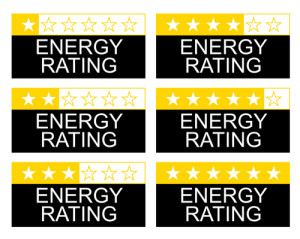With today’s high energy costs and concern about the environmental impact of consuming fossil fuels, there’s a growing trend toward improving energy efficiency in our homes. A home energy rating is a valuable tool that can help you gauge your home’s efficiency so you can make targeted improvements and reduce energy consumption.
Learning your home’s energy rating also allows you to compare your home’s performance to other homes and verify the value of energy improvements you’ve made or plan to make to the home.
What Is a Home Energy Rating?
 A home energy rating is an in-depth evaluation of the structure’s energy efficiency. It’s performed according to the standards of the Home Energy Rating System (HERS) index, a nationally-recognized scoring protocol for measuring residential energy performance. Introduced in 2006, HERS is overseen by the Residential Energy Services Network (RESNET).
A home energy rating is an in-depth evaluation of the structure’s energy efficiency. It’s performed according to the standards of the Home Energy Rating System (HERS) index, a nationally-recognized scoring protocol for measuring residential energy performance. Introduced in 2006, HERS is overseen by the Residential Energy Services Network (RESNET).
During the evaluation, a RESENT-certified home energy rater gathers data about the home. Using specialized software, the data is compared against an imaginary “reference home” that’s the same type, shape and size. To make the comparison accurate, the software takes into account the climate in a home’s location and uses average household energy consumption as a benchmark.
The program gives the home a confirmed numerical rating that reflects the state of its efficiency in relation to the reference home. It also generates a detailed report that describes how the home is using energy. The report identifies areas of energy waste and offers recommendations on upgrades and improvements. A projected home energy rating can also be assigned for homes that are being built or improved to gauge the anticipated efficiency and energy costs.
Understanding the HERS Rating Scale
The HERS rating is based on a linear numerical scale. The lower the score a home is assigned, the greater its energy efficiency.
- The rating of the reference home is set at 100, which is considered the efficiency of a standard new home.
- Each point on the HERS scale represents a one-percent change in energy efficiency. According to the U.S. Department of Energy, the average resale home has a HERS rating of 130, so it’s 30 percent less efficient than a standard new home.
- Homes that generate energy through solar, wind or other means typically receive the lowest ratings. A rating of 0 indicates net zero energy use, where energy production and use cancel out.
Who Are Certified Home Energy Raters?
Home energy ratings are performed by professionals who undergo rigorous training and pass a specialized exam to become certified through the Residential Energy Services Network. They must adhere to the RESNET standards of practice and strict code of conduct.
How Is a Home Energy Rating Performed?
To evaluate the state of your home’s energy efficiency, a RESNET-certified home energy rater gathers data and performs various tests including a duct leakage test, combustion analysis, blower door test and infrared scans. These tests help the rater gather vital information about:
- Air leakage through the structure’s envelope
- Leakage from the HVAC system’s air ducts
- Insulation effectiveness in the ceilings and walls
- Combustion device performance and safety
The evaluation also considers other variables that can directly impact energy efficiency, such as:
- The condition of the attic, foundation and crawl space
- Floors over unconditioned areas such as basements and garages
- Doors, windows and vents
- Water heating system efficiency
- HVAC system efficiency
- Thermostat functionality
- Lighting and appliance efficiency
- The home’s solar orientation
All the information gathered is then analyzed by RESNET-certified software. The results of the rating tell you about your home’s performance in four key areas: water heating, heating, cooling and lighting/appliances.
You’ll learn about the annual energy consumption and costs of these four areas, as well as whether the home complies with current energy codes. The rating report also provides a list of recommended improvements, along with a cost/benefit analysis and expected ROI for the upgrades.
Learn more about Gentry Heating Inc.’s solutions to improve your home energy rating, or give us a call at 828-581-4045.
Image Provided by Shutterstock.com



